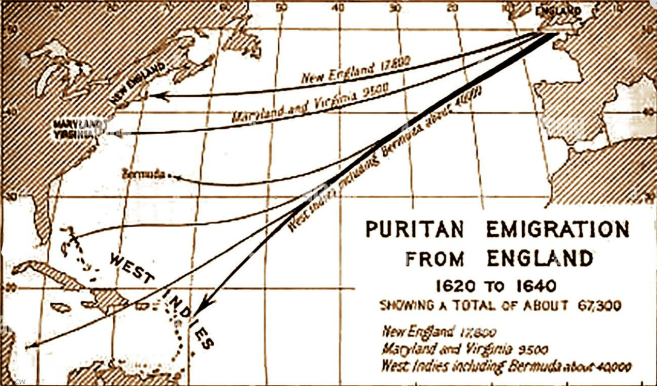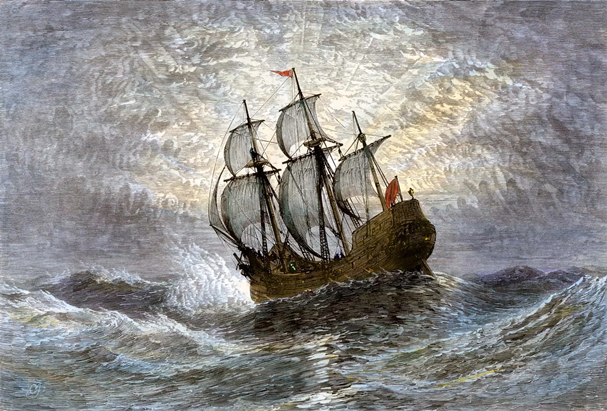Pilgrim to Pioneer: A Multigenerational Journey
European Ancestors’ journey from European Wars of Religion to the cultural American West.

The journey from pilgrim to pioneer begins in Europe in places like Avesnes and Sedan, France as well as Henlow, Sandwich, Gravesend, and London, England. It is from these and many other ancestral pilgrim families left Europe during the Great Migration between 1620 and 1640, a period of religious, political, or economic upheaval, prompting the initial departure of the ancestors seeking a better life and greater opportunities. They embarked on perilous voyages across the Atlantic Ocean, enduring harsh conditions and uncertain futures, driven by the promise of religious freedom, economic prosperity, or the lure of new lands.
Upon arrival in Colonial America, the ancestral pioneers encountered a rugged and untamed wilderness, inhabited by indigenous peoples and teeming with natural challenges. They experienced earthquakes and hurricanes and pandemics. They established homesteads, farms, and communities like Plymouth and, Boston Massachusetts, Augusta, Maine, as well as Hartford, Connecticut, and New York City laying the groundwork for the burgeoning colonies that will eventually form the United States.
Across generations, the family navigated the trials and triumphs of colonial life, facing conflicts with indigenous peoples during the Pequot, and King Phillips wars. They had conflicts with religious authorities during the Antinomian Controversy, and with English authorities during Leisler’s Rebellion, as well as with rival settlers. They contributed to the growth and development of the colonies, participated in agriculture, trade, and governance, in places such as Chelmsford, Massachusetts, Norwalk Connecticut, and Ann Arbor, Michigan while preserving their cultural heritage and traditions.
As the colonies expanded westward, spurred by Manifest Destiny and the quest for land and opportunity, the descendants of the original settlers embark on a continuous journey west. Successive generations traverse vast distances, crossing mountains, rivers, and plains, encountering new landscapes and frontiers.
They confront the challenges of frontier life, including harsh climates, isolation, and tension with the dishonesty of others. Yet, they also find freedom, adventure, and the opportunity to build a new future.
Over time, their descendants adapted to the demands of western life, establishing farms, towns like Le Roy, Michigan, and settlements like Plymouth, Washington, contributing to the development of the region and shaping its identity. They participated in, or witness key historical events, such as the American Revolutionary War, the Civil War, the expansion of the transcontinental railroad, two world wars and several economic recessions.
Through perseverance, ingenuity, and collective effort, the multigenerational journey from Europe to Colonial America to the modern Western Frontier embodies the spirit of exploration, resilience, and the pursuit of the American Dream. It is a testament to the enduring legacy of those who dared to seek a better life and forge a path into the unknown.
Popular Categories
Pilgrim to Pioneer Posts

5 Multiple “Firsts” triumph over the tragedy of being first.
JOHN TILLEY and JOHN HOWLAND’s first contact with the Indigenous people was one of violence.Read More »
4 The Mayflower Journey and its Compelling Events
The leaking Speedwell carried the FORD and TILLEY families from the Netherlands to Southampton, England to connect with the Mayflower. Then the TILLEY family transferred from the Speedwell to the Mayflower and were joined by JOHN HOWLAND. The FORD family …Read More »
3 Refuge in Netherlands: Religious and Social Tolerance
Netherlands The Netherlands was an appealing place for protestants to seek relief from persecution. Seven Dutch provinces in the Spanish Netherlands formed a mutual alliance and revolted against Spanish rule. That alliance established the Dutch Republic in 1581. The small …Read More »
2 English Ancestors Triumph by Escaping from Religious Wars
ELIZABETH TILLEY’S ancestors and less than half of the English population in the 14th Century survived the Great Famine and Black Death. Henry VIII’s broke from the Catholic Church. Protestants broke into varying factions including Separatists and Puritans. Exploration and …Read More »
1 Risky Challenges Converting From Catholic To Protestant
Direct relatives born around the time Columbus arrived in the Americas became the grandparents of JESSE DE FOREST and MARIE DU CLOUX. They lived in Northeastern France and engaged in the textile business. They grew up in an era when …Read More »


